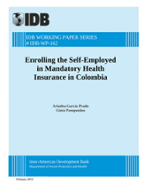Enrolling the Self-Employed in Mandatory Health Insurance in Colombia
Date
Dec 2008
English
(266 downloads)
The introduction of mandatory health insurance in developing countries is often questioned because of the difficulties in enrolling self-employed workers, who represent a segment of the labor force that is increasing in size. Partial population coverage, coupled with adverse selection effects, raises serious concerns about the financial viability of social health insurance schemes. Despite these difficulties, an increasing number of developing countries have implemented social health insurance schemes with the aim of attaining universal health coverage and improving access to health services. In Colombia, major health sector reform was launched in 1993 with the extension of mandatory social health insurance as its cornerstone. In this paper, we assess the impact that Colombia¿s health sector reform had on the enrollment of self-employed workers in the social health insurance scheme. We use two national-level Living Standards Measurement Surveys conducted in Colombia in 1997 and 2003, respectively, and find that health insurance enrollment rates among the self-employed increased considerably between the two time periods, although evidence of adverse selection observed in 1997 continued to be present in 2003. We identify several factors that may explain the change in these enrollment patterns, and we discuss measures to combat adverse selection.



